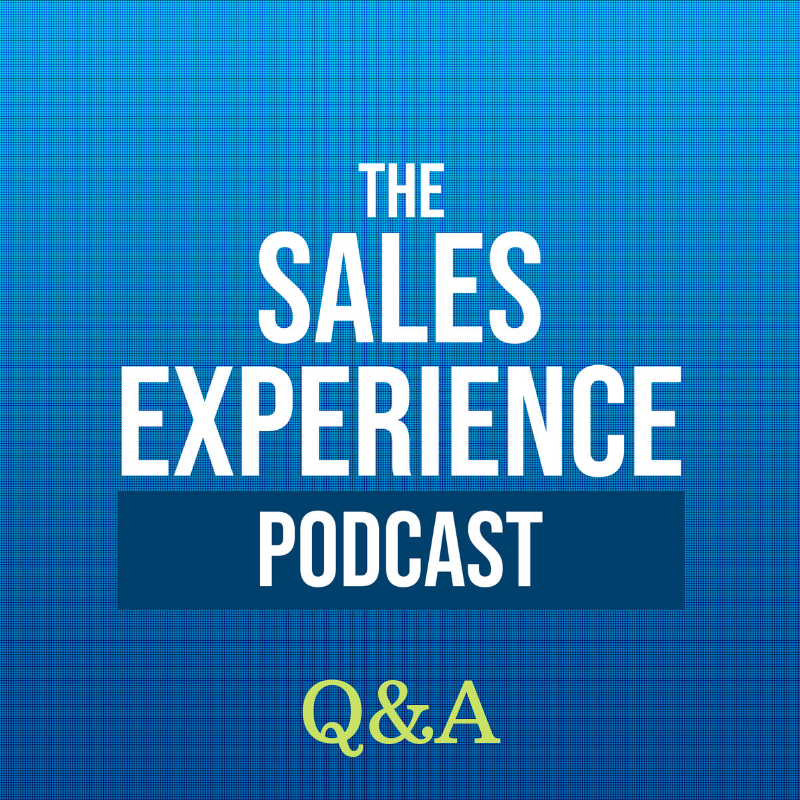Episode Transcript
Jason: Welcome back to the sales experience podcast. Welcome to another guest episode. This is part three of four, my conversation with Maya Conant, and we are going to continue the conversation. If you didn't check it out, there's two other parts. This is the continuation of that conversation. So make sure to subscribe, go back, listen to those episodes or wait for all four of them and binge them.
Maybe that's where you're at now in this process. Let's go ahead and kick into this episode.
Maya: I have no clue what this is, how it's going to move the needle for our business. That's problematic and I think sales people need to get ahead of that, especially in this era of frozen budgets or resource reallocation between teams and departments.
Jason: Exactly. And it's interesting because a few minutes ago you were talking about breaking down the silos and having everyone work together. What do you think? Because when I look at the organizations or the departments I've seen where it's just totally head to head, right? It's just like battling it.
Marketing thinks sales sucks because they're not closing enough deals. Sales thinks marketing sucks because they're not giving them the good leads that they can close, right? Everyone's got these different things. You're talking about the metrics. Everyone's got the numbers, but it's different. You got to align those KPIs.
But what do you think about some of that issue and the resolution of that issue? Is transparency and trust in the data, in the organization and in each other.
Maya: a thousand percent. So it's all to me. It's all about real time visibility, right? So visibility is one thing like you can see, ask somebody for a report from another one of these teams, but real time visibility makes people accountable, right?
Because they have no choice but to make sure things are the way they are. And the problem is a lot of companies aren't equipped with the right technology to be able to do that, but those exist out there and the best part is that once you have that real time visibility, it becomes this communication is so much easier across these teams because again, they're looking at the same exact data and it's up to date.
They're not having to look at stale data that is. from a couple of weeks ago when we had this original meeting around X component, right?
Jason: And I'll tell you from my experience, because I would lean more towards the sales side when it's sales and marketing. Marketing is a tool to help sales. I can also see both parts because marketing has to do the right thing.
But sales is generally in my experience responsible for not closing effectively because they're expecting the good leads or they're just waiting for the good leads and they're missing an aspect. So there's both sides. When you're talking about this real time metrics and real time visibility and transparency, the thing that I know that would solve, and this is for anybody leading an organization or has an organization and they have that battle between sales and marketing, is that kind of strategy is one way to overcome the fact that every department is going to take their metrics and their stats.
And then spin it and sell it to everyone else in such a way where they're not completely at fault or they're not completely dropping the ball. It's just natural. It's just human behavior. Nobody wants to look bad. No one wants to get in trouble. Everyone's going to defend themselves to some level.
When you're dealing with salespeople, they're the worst because they sell for a living. So they will sell you why it's never their fault. And if you're in sales and You're listening to this and you constantly have meetings with your manager and you're constantly telling your manager how it's never your fault.
If you would apply that sales skill to your actual conversations, you would probably actually do better.
Maya: Yeah. And so I think another big piece of this is automating things rather than relying on manual data entry. And there are so many technologies out there now. that help with this automation and therefore you can't manipulate the data.
It is what it is and there's very little variance in the accuracy of that if it's automated. So I think now we're at a place where we have those technologies like ready to help us do that. The numbers don't lie often when it is automated, when it's done manually, that's a different story.
Jason: But yeah, one thing I've seen is that sales people worry about only being able to win if they use manipulation tricks.
Tactics and hard closes. So they end up struggling to close deals, make their quota or earn the kind of money that they want to make. If this sounds like your current situation, or maybe you want to make more money in sales without feeling like you're selling, then my upcoming book called selling with authentic persuasion will help.
In it, I'm going to take you on a journey to transform from order taker to quota breaker. If you're ready to become an authentic persuader, crush your goals, and create success in your sales career, then go to jasoncutter. com. Again, that's jasoncutter. com and pre order the book today. Both automated and real time, because the more real time you can do it, the less time everyone has to spin it to somebody else and tell them whatever story they want to tell.
And again, obviously there's the side of us that we all want to protect our ego and ourself and we don't want to be in trouble. But if you take a more collaborative approach and the corporate culture is one of working together and always wanting to row the right way and understanding sometimes mistakes happen, people mess things up, campaigns fail in marketing, sales teams struggle, like whatever it is.
But if you identify those together and everyone understands like just because you made a mistake doesn't mean. Everything is your fault. We'll just work on it together. If you have that corporate culture, then everyone's moving ahead under this CRO bubble, like you're talking. Yeah.
Maya: And it's really about the communication under that.
So when you have the real time visibility, that's having it isn't enough. It's like ensuring there is that. Proper communication flow on top of that. And to be honest, what it does is it actually eliminates a lot of meetings. If you have that real time visibility, you don't have to get together twice a week to talk about our sales and marketing aligned on the same KPIs.
You've set them earlier. And then now you can just see how we're tracking towards those versus having to check in twice a week in a meeting with your sale report. And your spin of the story, right?
Jason: No, it makes total sense. And, that eliminates a lot of things. And then, instead of going through the data and having to analyze it or spin it in a certain way, or have meetings about spinning the data, it's okay, what is it saying?
What are we going to do? What did we say we were going to do before? What do we need to do now? And how do we just win for the sake of the company, the employees, and the customers?
Maya: Yeah, I think the most successful companies are really focused on the future and not focused on what didn't work well in the past.
And that's why they bring in people from the outside who have done this before, right? Who've scaled a company who's entered a new vertical because they're really future focused and they don't know the history of. X, Y, Z failed, and there was bad blood around this and that. They really are focused on, say, that two year, three year, four year horizon.
Jason: I think that's fascinating, because I hadn't really thought about that in those terms. Which I love that you said, when somebody new comes into an organization or it's a consultant, or it's a new hire in a new either department or vertical, whatever that might be, they don't know the history. They don't know the baggage.
They don't know that in a meeting three years ago. Jill said that my campaign sucked and I'm still mad at Jill and it's me against all of that department from now on and that might sound petty and silly and people might be laughing to what I'm saying, but that literally is what happens, right? There's baggage.
Somebody didn't say hi to me at the water cooler one day. And so since then, I'm giving them all the bad leads, right? Or because they did this, whenever I get their marketing campaigns, their market qualified leads, I think they're bad, right? And so a new person doesn't have that baggage. They don't remember.
They don't know the past.
Maya: Yeah, they don't know the past, but they're also just like trying to make an impact right away. And I guess the best way to make an impact is to change processes to become more efficient. It doesn't matter what role you're in, right? Come to an organization. You want to create change to prove that you're supposed to be there.
And so these kind of incoming change engines are inherently focused on how they can make things more efficient, connected, and predictable long term.
Jason: Where do you think that balance is though when somebody new comes in, right? And this is for sales reps, managers, leaders, for anyone listening. Where somebody comes in and they want to make that statement, they want to make a change.
And the balance between changing things they should or making changes because they want to leave their impression. And so they're changing things for the sake of changing things.
Maya: Yeah, I think that the first step is talking to the kind of historical stakeholders who've been there before and have seen the good, bad, and the ugly to understand what's worked and what hasn't.
And then where those people. See opportunity for growth and then consolidating that feedback into a more cohesive plan to implement said change. So I think it does take a little bit of understanding the past, but getting in the nitty gritty details like you described them, what tips might have existed in the past, but it's like really talking to folks who've been there to learn what would have helped them, right?
And again, bring it back to the personal, if you could have changed things a year ago, how would you have done it now looking back, right? Hindsight's 2020, which is a real funny statement. A lot of people are using right now relates to this crazy year. So yeah, I think sometimes hindsight is 2020.
So Make sure that you're talking to those people who've seen it before, but then take that, consolidate the feedback, and really roll it out according to priority there.
Jason: Alright, that's it for part three of four. Come back tomorrow, catch the final part. I'm gonna do something on that where I'm gonna do a little diversity sandwich.
And we're going to talk about what we covered in the beginning of the conversation. I'm going to wrap it up towards the end as well and bring that back in, tie everything in the conversation with Maya all together. As always, keep in mind everything in life is sales and people remember the experience you gave them.
![[E248] Directing Revenue, with Maya Connet (Part 3)](https://episodes.castos.com/salesexperiencepodcast/images/TSEP-Maya-Connet-Cover.png)


